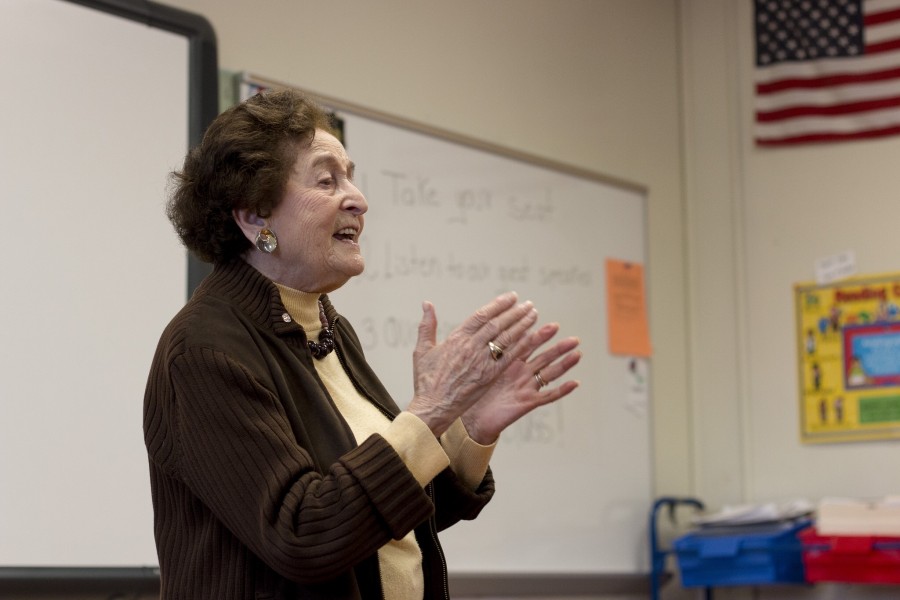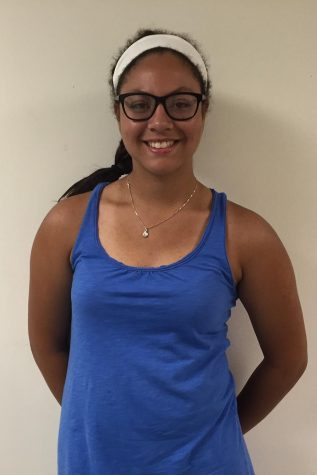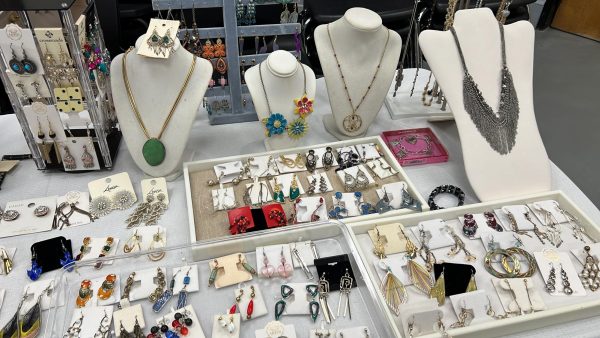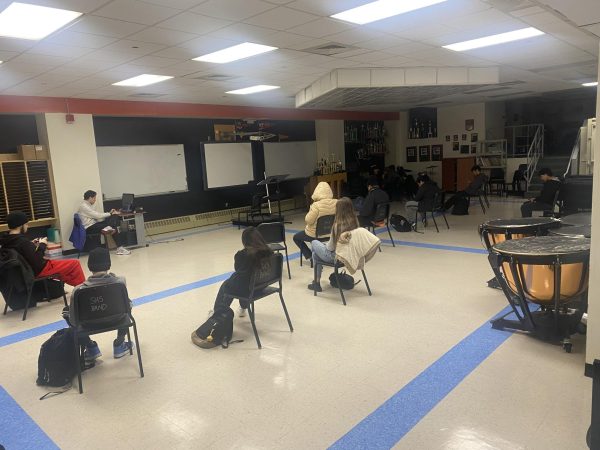Holocaust Survivor Speaks to English Class
May 12, 2015
On Wednesday, May 6, about 40 students had a special guest, Judith Altman, come talk to their English class. Altman, born in 1925, is a Holocaust survivor originally from Czechoslovakia.
The students of English teacher Kristin Veenema and ESL teacher Janell Iyer were doing a unit on war diaries. Iyer had heard of Altman, and suggested that they try to get her to come and speak to the class. Iyer contacted Altman, who speaks over 25 times a year at different events.
Altman began her story by telling the students that “it is important you listen,” and that after the war her and other survivors said “never again, but it is still happening.”
In 1939, the Nazis invaded Czechoslovakia and split the country into four parts. The Nazis separated the Jewish people from the other three groups and made the Jews (in addition to other minority groups) wear markings on their clothing so people could identify them. Jewish businesses were shut down, either because of a loss of customers or because the Nazis took over the shops. The Jewish people were restricted in their freedoms and Altman, along with all the other Jewish kids, were forbidden by law from going to school. Some Jews that lived in Czechoslovakia, but were not originally from Czechoslovakia, were taken and deported to Nazi work camps in German-occupied Poland instead of the country they were originally from.
Her father owned a store, which was taken from him by the Nazis. Altman was the youngest of five children; she had three brothers and one sister. Her older sister was married and lived a few towns over with her husband and two children. No matter how bad Altman’s financial situation was, her mother always tried to send some money to her sister. One day the messenger came back and told the family that all the Jews in that town had been executed, including Altman’s sister and her family. Altman’s oldest brother smuggled himself out of the country, her other brother left to go to the United States, and her next brother was sent to a concentration camp. He survived, but was then sent to Siberia. Altman was given the opportunity to leave, but declined because she wanted to stay with her family.
In 1942, the day after Passover, the Nazis took over the town and ordered the Jews to walk to the cemetery. There, all the Jews were told to go back home and get all their valuables and bring them back. When they returned they were taken to a new place where there were 30-40 families in one house. After four weeks in the ghetto, the people from Altman’s town were put in cattle cars to be shipped to the camps, with 70 people per car. The cars were horrible; they were given a small bowl to use as a bathroom, and the car smelled horribly. One man died in the car, and a woman gave birth. Some of the people went crazy on the cars and the others had to restrain them so that the Nazis would not come in and execute the entire car.
On May 21, she arrived at the first camp, and the words that greeted the group were “work will liberate you.” The group was then lined up and the men were separated from the women. People were picked to work; the oldest woman picked looked about 35 and the youngest was about 14, and only healthy people got picked. Dr. Mengela (nicknamed the Angel of Death) came out and pointed to Altman and her niece and sent them to the left. Mengela sent Altmans’ mother and father to the right. Before her father was taken away from her, he put his hand on her head, the way he would do every Friday night for the blessing and said to her “Judy, you will live.” To this day, Altman says that those words were what kept her alive.
Altman and her group were then marched into a building where they were lined up and told to strip. The prisoners then got their hair cut and were sent to the showers. Her group was lucky that it was water that came out of the pipes, not the gas that came out of her parents’ showers. After the showers, Altman and the other prisoners were given a gray dress and wooden clogs. The women were then marched to their living quarters which was a room filled with overcrowded triple bunk beds. Once they got there an alarm went off, and the smell of burning hair was in the air. One of the young girls from Altman’s town asked the other prisoners what that smell was, and a veteran prisoner answered, “that is your parents.”
Altman was first in Auschwitz, and life there was bad. They woke up at 6 a.m. and waited out in the cold for the guards to count them to see if anyone had died in the night; then they got to go to the bathroom and got one small cup of water. Each prisoner was given one sip of soup at night, and one piece of bread a week. Other than work there was nothing to do, so they just sat and thought about their parents. They were given one shower a week, which was a frightening experience because they never knew if it was going to be water or gas that came out.
Shortly after arriving in Auschwitz, Altman and 1,000 other female prisoners were marched into a new working camp. The women were split up; half of them worked inside and the other half worked outside. At first Altman’s group worked outside then after several months the two groups switched so Altman was working inside with the machines. While working inside, Altman broke her arm on one of the machines. At the camps if a prisoner couldn’t work they were useless, so the Nazis killed the ones that couldn’t work. On what Altman had thought was going to be her last night at the camp, she was awakened in the middle of the night by a female prison guard. The guard saved Altman’s life by taking her to the hospital to get a cast and by explaining to one of the superiors that because Altman spoke so many languages she was a valuable part of communication with the other prisoners.
Shortly after that event the prisoners went on a death march to the next camp. They walked for three weeks; most of the prisoners were barely able to walk, and all of them starving, sometimes eating grass when there was nothing else to eat. When they arrived to the new holding place, there was no hygiene and no order. They got food once every day. It was at this camp that Altman’s niece died from disease. The last few weeks at that place were horrible, and the German officers that were once in charge had suddenly disappeared. All the prisoners were dying, and then finally soldiers in American uniforms came to liberate the camp. The soldiers told the prisoners that they were free and had the German doctors help treat the prisoners.
After they were liberated, Altman went to Sweden and continued her education. In 1948, she moved to America and made a pledge to make sure the world knows what she went through.
Altman left the students with four pieces of advice: “Learn all you can, because no one can take your education from you.” “If you see injustice, stand up.” “Don’t follow anybody,” and lastly, she told students to “hug your mom and dad and grandma and grandpa, and thank God that you have them and they have you.”
When students were asked what they thought of Altman, Doodley Brice, senior, said, “she’s strong… she stood up and told us about that, even when it was difficult for her to talk about… she’s a survivor.” Another student, junior Ann-Sophia Moreny said that after hearing Altman’s story she feels that “you cannot take life for granted; you have to be strong and persevere, because what you are going through is not as bad as what she went through.”
Editor’s Note: a previous version of this article misspelled Altman’s last name as “Altmin.” Also, the phrase “Polish work camps” in the fourth paragraph was changed to “Nazi work camps in German-occupied Poland” for clarity.
















Izabela Vimala • May 23, 2015 at 5:43 am
Just to be clear – there is nothing like “Polish work camp” in the whole world. You can find ONLY GERMAN NAZIS concentration camp established in occupied Poland. Here is reliable source about when you can learn TRUE: http://auschwitz.org/en/. The use of the such term withour adding who did it is insulting and hurtful to the Polish people.
Why are you shifting the responsibility of murdering million of lives from the German to the Polish people. Why are so cruel to Poles?
Do you know that 3 000 000 Poles were murded during WWII by Germans?
And one more thing – they were so called Nazis and they came from GERMANY.
Please correct and respect history! And all othose innocent people murdered there!
adviser • May 25, 2015 at 9:26 am
This error has been corrected for days now. Please understand that this was not a case of anyone trying to revise history, or be “cruel to Poles,” or disrespectful, or any of the other allegations you’ve set forth. Rather, this piece was written by a high school junior about someone who came and spoke to a high school English class. The section you are referencing was included as a passing reference, just as historical context. The student simply used an unclear wording (“Polish work camps”) as opposed to the ideal one (“work camps in Poland”). The error was a journalistic one, not a historical one, and to suggest that this (Jewish) student was deliberately trying to insult the Polish people and rewrite history is a little bit ridiculous, and also a little offensive.
Jakub Przedzienkowski • May 21, 2015 at 5:46 pm
The term ‘Polish work camp’ is incorrect. The German Nazis established the ‘Work camps’ on occupied Polish soil. The camps were not Polish as implied by the comment. Please correct the error.